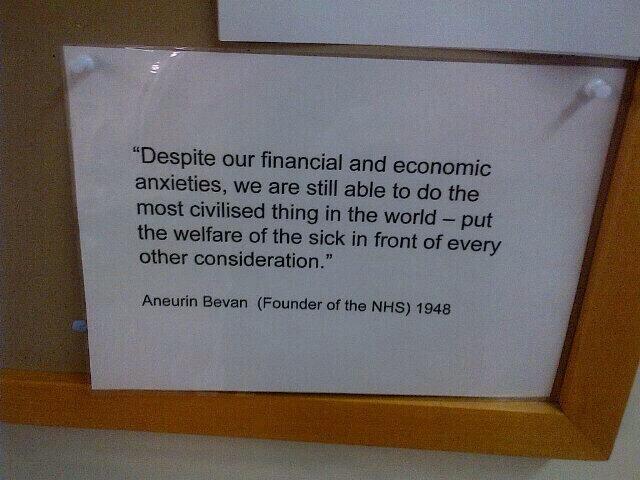Home » Posts tagged 'charismatic leadership'
Tag Archives: charismatic leadership
The vision to lead the NHS
If you look at this person’s billboard, you’ll find a very short passage from Aneurin Bevan from 1942.
Aneurin Bevan had his critics too. Bevan would often comment that the Labour Party was not inherently socialist: citing that one in five members of Labour at the time were truly socialist.
Still, Bevan and Attlee carried on regardless. Here’s a comment from Bevan from 1946.
Bevan left school at 13. He didn’t go to Charterhouse and Oxford.
The vision of the creation of the NHS is indeed one of the things which truly shocks critics of socialism. And for decades various Governments have been trying to undermine the National Health Service.
You can in fact tie yourself in knots over definitions of socialism, but certainly equality of opportunity for treatment and care (equitable access), solidarity, cooperation and collaboration might be strands. The idea of efficiently planning resources for the greater public good of the country might also be in the mix.
Lloyd George himself said it would be indecent for a democratic dictatorship to emerge from the National Government which had been put on a “war footing”.
Cameron and Clegg put us on a war footing, despite not having won the 2010 general election. But the war footing was to use the five years to extract as much money out of the public service and outsource it to the same bunch of people, as per outsourcing and privatisation of NHS, probation services, Olympics or workfare. These people are in the private sector.
Diverting resources from the public sector to the private sector is privatisation.
The result of this war footing for the NHS was an Act of parliament which did not have a single clause on patient safety, apart from the abolition of the National Patient Safety Agency; so it is rather ironic and foolhardy perhaps that Jeremy Hunt would wish to campaign on this issue.
The 493 page Act of parliament has been used to spin a number of lies, such as GPs being in the ‘driving seat’. CCGs, or clinical commissioning groups, are simply insurance schemes which apportion risk to local populations, and work out how much money should be alloted to them for their future care or treatment (and how it should be spent.)
They are conceptually the same as the “health maintenance organizations” (sic), borrowed from the United States.
The absurdity of it is that the NHS was borne out of the failure of private insurance approaches before the War, so why should we wish to return to an inequitable fragmented country which the Attlee government had tried so hard to repair?
That war footing for the NHS was a convenient way to shoehorn in that famous section 75 and its Regulations which provided the jet engine for a market – competition. This market needed to be ‘regulated’ (in as much as the cost of living crisis has demonstrated the failure to regulate an oligopoly of companies which can legally collude in setting prices). And there needed to be a régime for fast managed decline of NHS trusts.
Private markets are fragmented, and always introduce “transaction costs” leading to waste and inefficiency. Directors of private limited companies have a primary duty to make a profit for their shareholders, and that’s the case even if you’re using the “NHS” as a logo or kitemark.
And you can take treatments out of scope. This is rationing. It happened under the previous Government, is happening under the current Government, and will happen under the next.
And it cost £3bn – money which could have been better spent elsewhere, such as on the frontline.
The myths keep on coming and coming and coming.
Who’s going to pay for the NHS going seven days a week? Are NHS Consultants simply going to accept a unilateral variation of contract with no mutual agreement? It might be a case of ‘see you in court’.
The next Labour government needs to set out a vision which can inspire the general public, and equally importantly inspire the staff of the NHS.
The staff of the NHS do not want to be told that ‘a culture of evil has become normal’ by the Secretary of State for Health. They want some dignity and respect too.
They don’t want a technocrat who can implement textbook ‘transformative’ leadership, such that they can turn their NHS Trust into the healthcare version of a motor car production plant.
They wish their views to be respected, and where they can speak out safely where something goes wrong.
Nobody’s ever dared to discuss with the public the effects of PFI on local economies, or the billions of efficiency savings, but, if indeed ‘transparency is the best disinfectant’, we need all major political parties to speak openly about this issue.
It might be that “clinical leaders” need to grow some balls where possible to neutralise some who are overly aggressive NHS management seeking to balance budgets and hit targets at all costs.
I’m sorry if this sounds like a rant more fitting for a left-wing version of Katie Hopkins (perish the thought).
But we need a vision.
That vision is the SHA.
If I could subpoena Cameron and Clegg to do a leaders' debate now, I would
If I could subpoena Cameron and Clegg to do a leaders’ debate now, I most definitely would. As a student of a MBA course going at a very fast rate, it is easy to get a feel for a flavour of the management and leadership styles of David Cameron, and to understand why he personally, and his Tory-led government, are doing catastrophically badly. I exclude Nick Clegg and the Liberal Democrats, whose ‘once-in-a-lifetime’ opportunity to transform the nature of politics on the left-wing has been utterly wasted. Nobody sane would expect Nick Clegg to face the music in a Leaders’ debate in 2015, for example.
The issue with the Tory-led government is that they have a sole core competency, that is to reduce the deficit. However, the mechanism by which they are doing it is causing considerable damage to the recovery which had started in the first few months of their current (and probably) last term of government. By having no coherent policy for generating growth, they potentially could worsen the deficit by decreasing tax receipts and increasing benefit spending. It’s like having a credit card when you’re unemployed, but you are sanctioned from having any source of income.
David Cameron also fails as a leader in a number of textbook ways. As a potential transformational leader, he does not have the support of key followers essential for a change management to succeed, say in the public sector. Essential in this change management is not doing the change too fast, and having some symbols of success. Instead, David Cameron faces increasing waiting times and a plethora of equally disastrous metrics in NHS management, and the ultimate accolade in manufacturing output, the GDP, is deterioriating all the time. His preferred management style for running the public sector is ‘lean management’, which runs two grave dangers. Firstly, it can be extremely difficult to do a root cause analysis of problems when things go wrong, and secondly there is little functional slack. Take for example the recent riots. In an overstretched, underfunded, police service, it is difficult for the police and justice system to mount a satisfactory response. Amazingly, they have, but despite a dangerous level of cuts.
David Cameron has equally proven himself as a poor crisis leader. Over the riots, where he was accused of spending too long in Tuscany, and over the hacking crisis, where the evidence provided by Goodman, Coulson and Murdoch continues to cause problems, Cameron has been seen naked in responding way too late after the events; and again he suffers from a lack of trust by his followers, the UK general public.
Furthermore, in textbook terms, David Cameron fails as a charismatic leader. This was first identified really by Mary Liddell who wondered some time ago whether the general public could grow to embrace David Cameron. Indeed, Liddell was right. They couldn’t. The result was a hung parliament, with a completely ineffective Nick Clegg, driven by a personal dislike of Gordon Brown and ‘liberal principles’, led his party at Westminster to vote against EMA and the rise in tuition fees. No wonder his political party was slaughtered in the local elections.
So, I do come back to my basic thought: if I could subpoena Cameron and Clegg to do a leaders’ debate now, I would. Tragically, the country is stuck with them until 2015.
Please vote for http://www.shibleyrahman.com in the Total Politics Blog Awards 2011.



